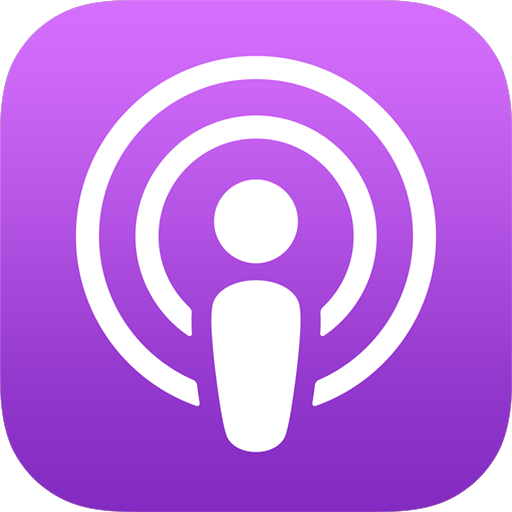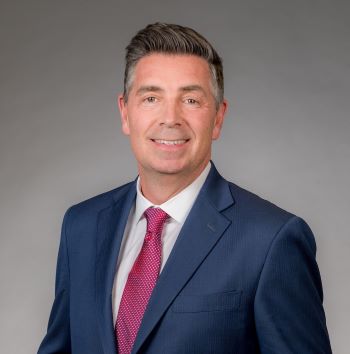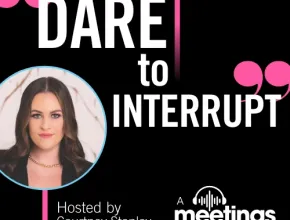AHLA President & CEO on Safe Stay and What Planners Need to Know Now About Hotel Industry
Meetings Today's Sarah Kloepple talks with Chip Rogers, president and CEO of the American Hotel & Lodging Association (AHLA), about the organization's Safe Stay guidelines, supporting hotel workers as these new healthy and safety protocols are put in place, and how technology will play a critical role in future live meetings. Listen below.
Also available on iTunes, Google Play and Pocket Casts.



Rather read the transcript?
[Start transcript]
Sarah Kloepple: Hello, everyone, and welcome to this Meetings Today podcast. I'm Sarah Kloepple, content developer, destinations and features for Meetings Today. Joining me today is Chip Rogers, president and CEO of the American Hotel & Lodging Association. Thanks for joining us today.
Chip Rogers: Sarah, great to be with you. Thanks for having me.
Sarah: Of course. So the hotel and hospitality industry is obviously hurting right now, and we're of course hurting for it too. Our brand and our readers love this industry and the people who make it so enjoyable. But recently, many hotel chains have released these tentative reopening plans and initiatives, where they're laying out new protocols for safety and enhanced sanitation.
And a few weeks ago, the AHLA came out with Safe Stay, which is, I think, meant to be an industry-wide guideline for how hotels should operate once they reopen their doors. So to get started, Chip, can you just tell us a bit about Safe Stay and how the program came together?
[The Broadmoor Ups Its Tradeshow Game With New Broadmoor Exhibit Hall]
Chip: Yeah, thanks for the question. So Safe Stay is the industry-wide standard for the guidelines in operating your hotel during this pandemic period. And what many people are calling, I think you characterized it as well, this kind of the economic reopening. It's interesting to note that most hotels didn't close down. They have been labeled as essential businesses in most places because hotels were used to house medical personnel, in some cases used for hospital overflow, in some places used for quarantine. So hotels just about everywhere. I think maybe one state, maybe Maine, had closed down hotels.
 But the question was: How do we create the message to consumers and to staff members that hotels are clean and ready for business again? So as we saw all the brands doing different things, we kind of brought everyone together and said, “Can we all agree on a set of baseline standards that the entire industry can rally around and then build off of?” And that's what you see with Safe Stay.
But the question was: How do we create the message to consumers and to staff members that hotels are clean and ready for business again? So as we saw all the brands doing different things, we kind of brought everyone together and said, “Can we all agree on a set of baseline standards that the entire industry can rally around and then build off of?” And that's what you see with Safe Stay.
So these guidelines have been endorsed by the 16 largest hotel brands in the U.S. They've been endorsed by almost every single state lodging association across the U.S., many city lodging associations. They've been endorsed by US Travel, Global Business Travel, just about everybody has endorsed these as kind of the industry-wide baseline standards that we would use. So if you're a traveler, you can expect these standards to be applied at a minimum to any hotel you stay at across the U.S.
[Related: Back-to-Business Meetings Incentives for Planners]
Sarah: Gotcha. That's great. We'll link to Safe Stay report for people who want to read more about it. So obviously, you know, hotels will not look the way they did before for a while. What are some of the major ways in which hotels will look different and operate different, differently, when things kind of begin to welcome back business? Especially the meeting and event spaces inside hotels. I know planners are very curious about things like room sets inside those spaces, you know, when physical distancing needs to be implemented.
Chip: Yeah, I think there's distancing and spacing. Those are the two key words, right? And so, with respect to just about every hotel, you're going to see a lot more contactless check in. The good thing is is that this is not a technology we had to invent upon the coronavirus hitting us. This has been out for quite some time and really the industry was moving in that direction to begin with. So that was great news that the options were already there. Most brands have already adopted it. You're going to see a lot more of that. People who want to use the mobile app to go directly to the room and not need to go through a checkout process.
You're going to see social distancing in all public areas of a hotel. You're going to see it at bars and restaurants. You'll see it in the workout rooms. You'll also see it outside at the pool if a hotel has a pool. And so a lot of that stuff is frankly just common sense, but it is going to be set up and structured in a way that helps facilitate people not being too close to one another, unless of course the group that they're traveling with.
The second part that you're going to see a lot more of is frequent cleaning up the public areas. Now to remind people, the hotel industry, we’ve been through this before. We've been cleaning to the standards to make sure that we kill SARS and MERS and swine flu and all the other viruses that we've seen over the last 10 years, many of which structurally are not too much different than the coronavirus, and some of which were actually more easy to get through contacting something than the coronavirus. So we feel like we're in good shape there, but you're going to see more frequent cleanings.
The rooms, of course, are cleaned on a daily basis when people check out, but it's the public spaces that are going to be cleaned on a regular basis many times a day. And so you'll see that happening in front of you. Hopefully you can't see any dirt. So it'll just be cleaner and that’s good to know.
With respect to meetings and banquets, there's still a lot of work to do there. Because I don't think that necessarily the CDC or even states and localities have a full grasp on where they're going with regulations and how many people can be in a single place. Some of it seems quite arbitrary. Some of it seems, frankly, not necessarily scientific. But if you recall, it started with 1,000, and then it went to 500, then 250 and then 25. And now in most places, they're using 10. And we’re not sure of the scientific backing of 10.
Butt nonetheless, as we come out of this, and people understand how social distancing works, and I think the whole country certainly understands that now, I think what you'll see is structurally when meetings and events are set up, just the desks and the chairs and the seating arrangements will all be spaced out a lot more than they are now. And that will certainly help.
But the one big thing I think that's going to be much, much different is buffet service. That is going to be limited for quite some time. If there's anything that I suspect will be changed until such time as a vaccine is found and widely accepted among the population, it's going to be buffet service. So it may be a year or so before we start seeing buffets again. But that's going to happen. And then the final thing I'll say is that the PPE [personal protective equipment] will be available to those who need it and most importantly, to the staff who are there so that people have what they need to both feel safe and be safe.
Sarah: That's great. Yeah, I'm glad you brought up food and beverage. That's also a big factor when talking about, you know, getting meetings back online. And I'm glad to that you brought up your staff. I know it's been especially devastating to see hotels have to lay off or furlough their hardworking employees. But when furloughed employees are hopefully able to come back, how do you see hotels supporting them as they take on these new standards and protocols?
Chip: Well, the hotel employees are the lifeblood of the business. No question about it. When you think about hospitality, no one’s more important than the person being hospitable. And if we go back just a few months ago, back to say February 1 of 2020, not that long ago—though it might seem like a world ago for most of us—we were an industry that had 900,000 job openings across the U.S. 900,000. And we've been working for years to try to pull that number down and get more people into the hospitality industry, but the economy was booming, and the openings were there.
And now, where we sit today is in a situation where we polled our members just a week ago to find out, you know, what are staffing levels looking like? And about two-thirds of all hotels are at 50% or less of the staff that they had before coronavirus. And so I think that puts it in the right frame that most vast majority of hotels have laid off more than half of their workers. But as we see the economy picking up but it's already happening in some places. These workers are going to come back.
Now two things are at play here. One is you've got the enhanced unemployment benefits, which, frankly has not necessarily helped get workers back into the industry. I'm sure that will be changed at some point. And of course, those run out in July. But you've also got a situation where employees in some cases wonder, is my workplace a safe place to be? And that's why I think the Safe Stay guidelines are so critically important. Because not only are we talking about how clean the building and everything is going to be, but also the PPE that's going to be available for the personnel and the contactless interaction with guests, particularly on food and beverage.
Those things all matter. To create that mindset that if you're a staff member at a hotel, you're going to be safe and the safety of the hotel worker is the single most important thing, because guests are important, but guests come and go. The team members that we have are there every day, and without them our industry doesn't work.
Sarah: Great, yeah, that's wonderful. How else are hotels ramping up to get back to business? And how might meeting planners be assured of, you know, this kind of standard of service? When meetings get going again? I know you said it's a bit more uncertain to talk about meetings, you know, with local and state restrictions still in place. But is that something being discussed at all?
[Related: Go LIVE Together Fights for the Live Events Industry]
Chip: It is. I think we learn every day. And I think this is so important. If you think about the timeline of how we've processed through this. We all rely on the CDC, and the CDC clearly is doing their best, but they're also dealing with something that they haven't dealt with before. This is a unique virus. Even think about the world of vaccine therapies. I mean, therapy typically take years, vaccines take typically take multiple years. And yet we're as a country looking like we're going to get something by the end of this year. That's unprecedented. It's amazing.
But it's also recognition. We got to do things differently than we've ever done them before. So when you think about our industry, and where we were and where we are today, you know, we're learning something new every day. I think it's important that we all be flexible, that we don't say whatever standards we approach this problem with today are the standards we're going to use permanently. Because even yesterday, you had the CDC coming out and saying, you know, it's actually much more difficult to get the virus off of a surface transmission than we previously thought. So we do know that that social distancing is important. But the idea that you're going to get it off of a surface is less of a concern, which is important because that that dictates how we do things, how we have meetings and conferences.
Technology is going to play a critical role in this. We're already seeing this in some places in the world. But I can imagine a scenario where you have large meetings and conventions, where people are going to be checked in some capacity, whether it be a temperature check, a full type of health check. Maybe we get to the point where we have quick checks for the creation of antibodies in folks and if those exist, and you're given that kind of that clean bill, which you know, a vast majority of people will receive that, then you would be free to come and go inside of a large conference at your leisure. And so technology is going to play a key role.
But flexibility I think is most important. I do know that there is 100% commitment to getting back to the incredible events that really fuel our industry, that make hospitality so special. I can promise you this that if the free market system in the United States is allowed to work its magic, it will work and work well. We will figure this out. In fact, we probably already in some cases figured it out. We will implement it, and we'll get back to normal quicker than most people give us credit for.
Sarah: That's great. And I'm glad you mentioned how things are just changing so quickly in the wake of all this. But anything else you think is important for meeting planners to know when it comes to the state of the hospitality industry right now?
Chip: You know, even the flexibility of how we approach the processes that we use and the protocols that we use and how our guidelines are changing, I think that same type of flexibility with meeting planners needs to be in planning events. And I know it's already happening. I can imagine—we have meeting planners on our own team. You know, we've had to change a number of events that we had scheduled and how do you deal with that? Well, that's a relationship that you're going to have with not only among the meeting planners, but clearly among the facilities where you're having the events, and keeping that open line of communication.
Sharing best practices is critically important. You know, I've worked and sat down and talked with probably close to 100 different convention centers across the U.S. over the last five or six years. They all do things kind of a little bit differently, right? But if we're able to understand that this is changing at a rapid pace, events are going to be rescheduled. Things that work at one convention center may not work at another convention center. You know it, we have to have that flexibility, that open line of communication, all with the goal of getting these meetings and events back up and running again in the safest way possible.
[Related: Here’s What Hotels and Resorts Are Doing to Enhance Health and Sanitation Standards]
Sarah: Absolutely. Yeah, well, on a lighter note, what's really inspired you about the hospitality industry during all this?
Chip: So we have a program that we created called Hospitality for Hope. And I'll tell you how this started, it was pretty unique. We had the Department of Health and Human Services call us and say, “Look, we believe we're going to need significant numbers of hotel rooms to help with overflow capacity at hospitals, as the pandemic finds itself in certain hotspots.” And this was actually before the whole New York/New Jersey hotspot took off, but you could just begin to see it happening. And we said, “Sure, we'll see if we can find some of our hoteliers that are interested in that.” And then the next step was we thought, well, what about for quarantine purposes? And then what about for housing personnel that need to go to these hotspots, the medical personnel, the first responders.
And so we created Hospitality for Hope. I'll never forget, it was a Saturday we were working on this, and we sent out the message to our membership saying, “Hey, how many would be willing to allow their hotel to be used for these purposes?” Now, keep in mind that these are hotels that are really hurting, having to lay off workers wondering if they're even going to stay in business. I mean, the real core things about maintaining a business are at top of mind right now. And so I was probably thinking maybe we get a few hundred hotels. We ended up having over 17,000 hotels sign up for this program to make their citizens, make themselves available.
We then took that Hospitality for Hope idea and said, you know, what about for the employees? We have long held training and certification programs for employees that cost money. We don't really make any money off of it. We do have to at least pay the bills. So they cost money, but they provide incredible education, job-specific education to people in our industry. And so we said, I wonder if we could get some people to donate some money to where we could make these programs free for hoteliers? And I'm proud to say that over the last two months, we've made a number of these programs free. We've had over 13,000 people take certification and training programs to the tune of about $3 million worth of educational benefits.
And that all happened because folks were willing to step up and make donations during an extremely difficult time. So this is the best industry in America. I am 100% convinced of it. It's got the best people. It's got the most caring people. And what I've seen happen over the last two or three months certainly reconfirms that.
Sarah: Yeah, that's great. That's very inspiring. Wow, 17,000 hotels signed up. That's great. Well, thank you so much, Chip for joining us today. We really appreciate your time. I know we're all looking forward to traveling again and, you know, just meeting face to face. And thank you to those listening. Feel free to head over to MeetingsToday.com where we have a number of podcasts with industry thought leaders on a variety of subjects, including managing the coronavirus crisis. Thanks again and have a great day.
[End transcript]




